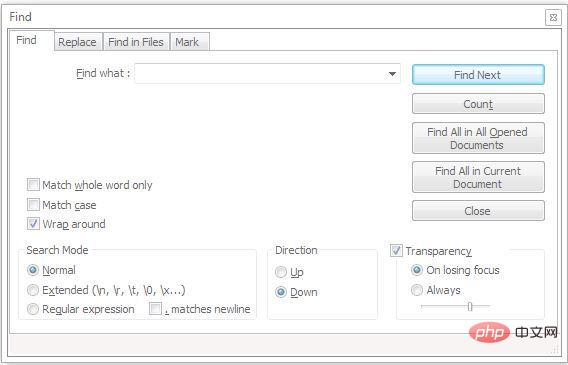
The following tutorial column will introduce you to the search function of notepad. I hope it will be helpful to friends who need it!  notepad
notepad
Search function (regular expression)
When you see this, you will definitely think there is something to learn from this! Haha, yes, the above contents are common sense that everyone knows. However, as you can see from the picture above, notepad supports three search modes: 
Normal mode
Commonly used expressions
Listed below are some commonly used regular expression matching symbols for the convenience of students to find and learn.
Marking and grouping The above symbols are for one character or for repeating one character, however, if What should I do if there are multiple characters? We need to use grouping. Regarding grouping, we can use parentheses Careful students will surely find that in addition to the search function supporting regular expressions, notepad's replacement function also supports regular expressions. The symbols above are also applicable to substitutions.
Characters
Description
##. Match any character
* Matches the previous character 0 or more times, for example,
ab*
matches "a", "ab" or "abb"
Matches the preceding character 1 or more times, for example,
ab
Matches "ab" or "abb", but not "a"
? Matches the preceding character 0 or 1 time, for example,
ab?
matches "a" or "ab", but not "abb"
{n} Matches the previous character or group n times, for example,
ab{2}c
matches "abbc".
##{m,n }
ab{2,3}c Matches the previous character or group, at least m times and at most n times (if n is empty, it means any number of times), for example, Matches "abbc" or "abbbc"
^
^ a The expression on the right side matches the beginning of a line, for example, Matches lines starting with "a"
$
z$The expression on the left is matched at the end of a line, for example, Matches lines ending with "z"
[] ##[^]
[ab] Matches any single character in the list, such as , matches "a" or "b";
[0-9] matches any single number 0-9
\w
Matches any single character except "a" and "b" Matches any single character outside the list, for example, [^ab]
\W
matches a single character, including underscores, equivalent to [A-Za-z0-9_]
\d
matches non-single characters, equivalent to [^A-Za-z0-9_]
\D
matches numeric characters, equivalent to [0-9]
matches non-numeric characters, equivalent to [^0-9]
Matches a word boundary (beginning or end), for example,
\bhe matches "hello" but not "ahello"
Matches non-word boundaries
|
or operator, matches the left or right expression The formula
\s
matches the blank format
\S
Match non-blank characters
\\
Match characters
\
Match Tab character
\r
Match the carriage return symbol
\n
Match the newline symbol
\r\n
Match carriage return and line feed
() to specify the grouping expression. For example: (abc)? means matching 0 or 1 abc, here A parenthesized expression is a grouping. Grouping can be divided into two forms, capturing group and non-capturing group. Capturing groups can be numbered by counting their opening brackets from left to right; non-capturing groups are groups that begin with (?) and do not capture text.
Character
Description
(…)A group of captures. The first group can be accessed via
\1, the second via \2.
(?:…)Non-capturing group.
(?=…)Non-capturing group – forward assertion. For example,
(.*)(?=ton) expression, when encountering the 'Appleton' string, will match 'Apple' .
##(? Non-capturing group – backward assertion. For example (? Expression, when encountering the 'sir William' string, the match is 'William'.
(?!…) Non-capturing group – negative forward assertion. For example, the
(?!e)
expression, when encountering 'Apple', will find every letter except 'l', Because it follows 'e'.
(? Non-capturing group – negative backward assertion . For example, (?, when encountering 'sir William', it will match 'William'.
(?P Name the captured group. Submit a name to the group for subsequent use, for example (?PA[^\s ] )\s(?P=first)
will match 'Apple Apple'. Similar to (A[^\s] )\s\1, but using a group name instead of a number .
(?=name) Matches the group named name.
(?#comment) Comment – Content within brackets will be ignored when matching.
The above is the detailed content of Detailed explanation of the search function of notepad++. For more information, please follow other related articles on the PHP Chinese website!